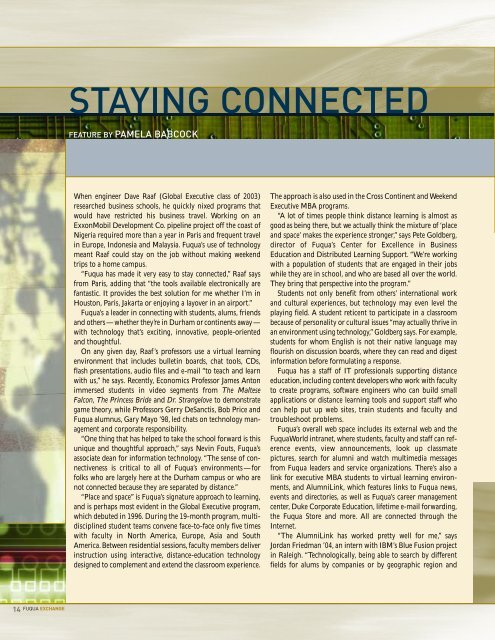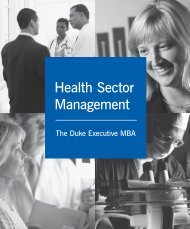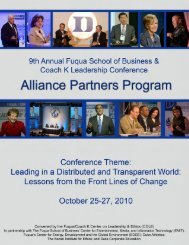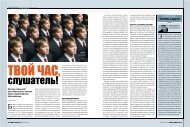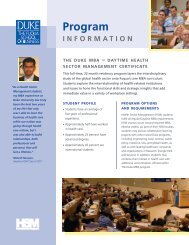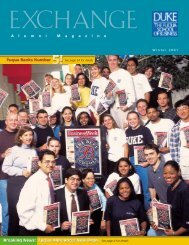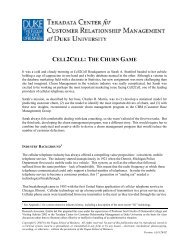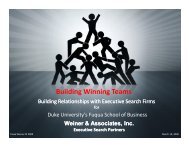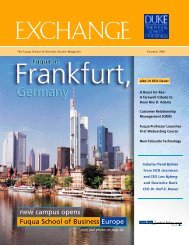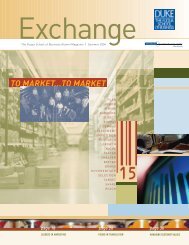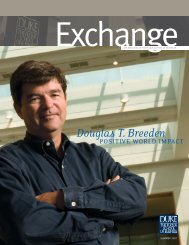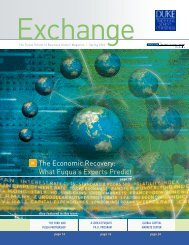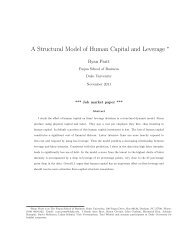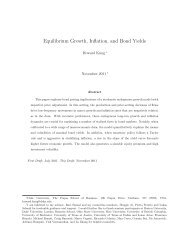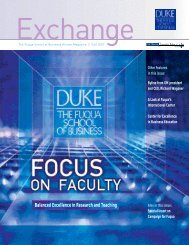Exchange Magazine, Fall 2003 - Duke University's Fuqua School of ...
Exchange Magazine, Fall 2003 - Duke University's Fuqua School of ...
Exchange Magazine, Fall 2003 - Duke University's Fuqua School of ...
You also want an ePaper? Increase the reach of your titles
YUMPU automatically turns print PDFs into web optimized ePapers that Google loves.
14 FUQUA EXCHANGE<br />
STAYING CONNECTED<br />
FEATURE BY PAMELA BABCOCK<br />
When engineer Dave Raaf (Global Executive class <strong>of</strong> <strong>2003</strong>)<br />
researched business schools, he quickly nixed programs that<br />
would have restricted his business travel. Working on an<br />
ExxonMobil Development Co. pipeline project <strong>of</strong>f the coast <strong>of</strong><br />
Nigeria required more than a year in Paris and frequent travel<br />
in Europe, Indonesia and Malaysia. <strong>Fuqua</strong>’s use <strong>of</strong> technology<br />
meant Raaf could stay on the job without making weekend<br />
trips to a home campus.<br />
“<strong>Fuqua</strong> has made it very easy to stay connected,” Raaf says<br />
from Paris, adding that “the tools available electronically are<br />
fantastic. It provides the best solution for me whether I’m in<br />
Houston, Paris, Jakarta or enjoying a layover in an airport.”<br />
<strong>Fuqua</strong>’s a leader in connecting with students, alums, friends<br />
and others—whether they’re in Durham or continents away—<br />
with technology that’s exciting, innovative, people-oriented<br />
and thoughtful.<br />
On any given day, Raaf’s pr<strong>of</strong>essors use a virtual learning<br />
environment that includes bulletin boards, chat tools, CDs,<br />
flash presentations, audio files and e-mail “to teach and learn<br />
with us,” he says. Recently, Economics Pr<strong>of</strong>essor James Anton<br />
immersed students in video segments from The Maltese<br />
Falcon, The Princess Bride and Dr. Strangelove to demonstrate<br />
game theory, while Pr<strong>of</strong>essors Gerry DeSanctis, Bob Price and<br />
<strong>Fuqua</strong> alumnus, Gary Mayo ’98, led chats on technology management<br />
and corporate responsibility.<br />
“One thing that has helped to take the school forward is this<br />
unique and thoughtful approach,” says Nevin Fouts, <strong>Fuqua</strong>’s<br />
associate dean for information technology. “The sense <strong>of</strong> connectiveness<br />
is critical to all <strong>of</strong> <strong>Fuqua</strong>’s environments—for<br />
folks who are largely here at the Durham campus or who are<br />
not connected because they are separated by distance.”<br />
“Place and space” is <strong>Fuqua</strong>’s signature approach to learning,<br />
and is perhaps most evident in the Global Executive program,<br />
which debuted in 1996. During the 19-month program, multidisciplined<br />
student teams convene face-to-face only five times<br />
with faculty in North America, Europe, Asia and South<br />
America. Between residential sessions, faculty members deliver<br />
instruction using interactive, distance-education technology<br />
designed to complement and extend the classroom experience.<br />
The approach is also used in the Cross Continent and Weekend<br />
Executive MBA programs.<br />
“A lot <strong>of</strong> times people think distance learning is almost as<br />
good as being there, but we actually think the mixture <strong>of</strong> ‘place<br />
and space’ makes the experience stronger,” says Pete Goldberg,<br />
director <strong>of</strong> <strong>Fuqua</strong>’s Center for Excellence in Business<br />
Education and Distributed Learning Support. “We’re working<br />
with a population <strong>of</strong> students that are engaged in their jobs<br />
while they are in school, and who are based all over the world.<br />
They bring that perspective into the program.”<br />
Students not only benefit from others’ international work<br />
and cultural experiences, but technology may even level the<br />
playing field. A student reticent to participate in a classroom<br />
because <strong>of</strong> personality or cultural issues “may actually thrive in<br />
an environment using technology,” Goldberg says. For example,<br />
students for whom English is not their native language may<br />
flourish on discussion boards, where they can read and digest<br />
information before formulating a response.<br />
<strong>Fuqua</strong> has a staff <strong>of</strong> IT pr<strong>of</strong>essionals supporting distance<br />
education,including content developers who work with faculty<br />
to create programs, s<strong>of</strong>tware engineers who can build small<br />
applications or distance learning tools and support staff who<br />
can help put up web sites, train students and faculty and<br />
troubleshoot problems.<br />
<strong>Fuqua</strong>’s overall web space includes its external web and the<br />
<strong>Fuqua</strong>World intranet, where students, faculty and staff can reference<br />
events, view announcements, look up classmate<br />
pictures, search for alumni and watch multimedia messages<br />
from <strong>Fuqua</strong> leaders and service organizations. There’s also a<br />
link for executive MBA students to virtual learning environments,<br />
and AlumniLink, which features links to <strong>Fuqua</strong> news,<br />
events and directories, as well as <strong>Fuqua</strong>’s career management<br />
center, <strong>Duke</strong> Corporate Education, lifetime e-mail forwarding,<br />
the <strong>Fuqua</strong> Store and more. All are connected through the<br />
Internet.<br />
“The AlumniLink has worked pretty well for me,” says<br />
Jordan Friedman ’04, an intern with IBM’s Blue Fusion project<br />
in Raleigh. “Technologically, being able to search by different<br />
fields for alums by companies or by geographic region and


